Can Vegans Drink Coke? Everything you didn’t know
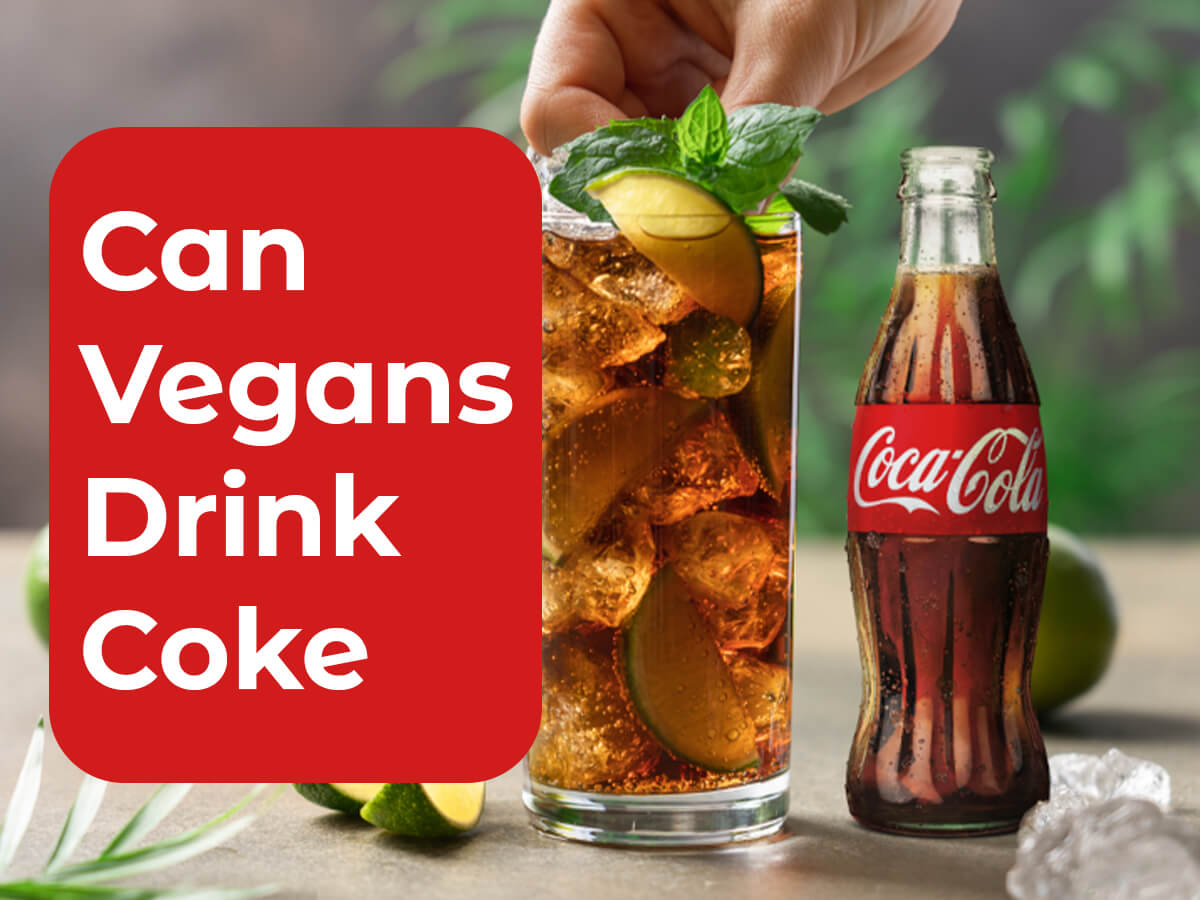
Hey, there, friends vegans, and environmentally conscious readers! As a vegan for the past 7 years, I’ve always sought new ways to align my lifestyle with my values.
Recently, I’ve been wondering about Coca-Cola and whether it’s a drink suitable for vegans. So I decided to dig deeper and find out if vegans can drink Coke. I did some digging and discovered some surprising information about the ingredients, production process, and environmental impact of Coca-Cola.
Join me as we explore the answers to some important questions: Can vegans drink Coke? What exactly is inside the bottle? And are there any vegan-friendly alternatives to Coca-Cola that I should consider?
Plus, let’s dive into the debate over carmine and other controversial ingredients and see if Coca-Cola conducts animal testing.
Join me as we explore these questions and more in this article. Whether you’re a vegan, someone who cares about animal welfare, or an environmentally conscious consumer, this article is for you. Let’s dive in!
Curious about veganism? Learn about the benefits, challenges, and how to get started in this beginner’s guide to a plant-based lifestyle. What is Veganism
In this article you will read:
Coke ingredients: What’s inside the bottle?
Coca-Cola is one of the most widely consumed beverages in the world, loved by people of all ages and backgrounds.
However, Regarding Coca-Cola, there is some confusion surrounding its vegan status.
Some people say it’s perfectly fine for vegans to drink, while others claim it contains animal-derived ingredients.
To understand why, let’s take a closer look at what goes into each bottle.
According to Coca-Cola’s official website, the primary ingredients in a classic Coke are carbonated water, high fructose corn syrup, caramel color, phosphoric acid, natural flavors, and caffeine.
While this may seem harmless at first glance, a few ingredients still raise concerns among vegans.
One such ingredient is caramel color, which gives Coca-Cola its signature brown hue.
Although caramel color is vegan-friendly, some forms are made using animal-derived ingredients such as casein.
Another controversial ingredient is natural flavors.
While these are generally considered vegan-friendly, the term “natural flavors” can be misleading as it doesn’t necessarily mean the flavors are derived from plant sources.
In fact, they may be sourced from animal-derived ingredients such as castoreum, a substance extracted from the anal glands of beavers.
The debate over carmine and other controversial ingredients
I know that carmine, a red pigment derived from dried cochineal insects, has been a hotly debated ingredient in Coca-Cola and other food and beverage products.
For example, Fanta Orange contains carmine, a red pigment derived from the crushed bodies of cochineal insects. Similarly, Fanta Fruit Twist and Lilt Pineapple and Grapefruit both contain beta-carotene. This coloring agent can be derived from animal sources.
As a vegan, I share the concerns of many in our community about using animal-derived products in non-essential items, such as food coloring.
It’s encouraging to know that Coca-Cola changed its ingredients in response to feedback from vegans and vegetarians.
In 2013, the company announced that it would stop using carmine in its products and use alternative colorants instead.
This is a significant step in the right direction, and I commend Coca-Cola for addressing our concerns.
That said, I also recognize that other ingredients in Coca-Cola and other products may not align with vegan values.
For example, glycerol, which can be derived from animal fats, and cochineal extract, another name for carmine, are still used in some products.
Another ingredient to watch out for is vitamin D3, often derived from lanolin, a sheep wool wax. Some Coca-Cola drinks, such as Minute Maid Orange Juice, contain vitamin D3, making them non-vegan.
It’s also worth noting that while the ingredients in Coca-Cola drinks may be vegan-friendly, the production process of Coca-Cola may involve the use of animal-derived filtering agents, such as gelatin or bone char. This means that some vegans may choose to avoid drinking Coke.
It’s important to stay informed about these ingredients and make conscious choices about what we consume.
Are you a vegan wondering if you can still indulge in your favorite fizzy drinks? Learn everything you need to know about soda and the vegan lifestyle here: Soda and the Vegan Lifestyle: What You Should Know
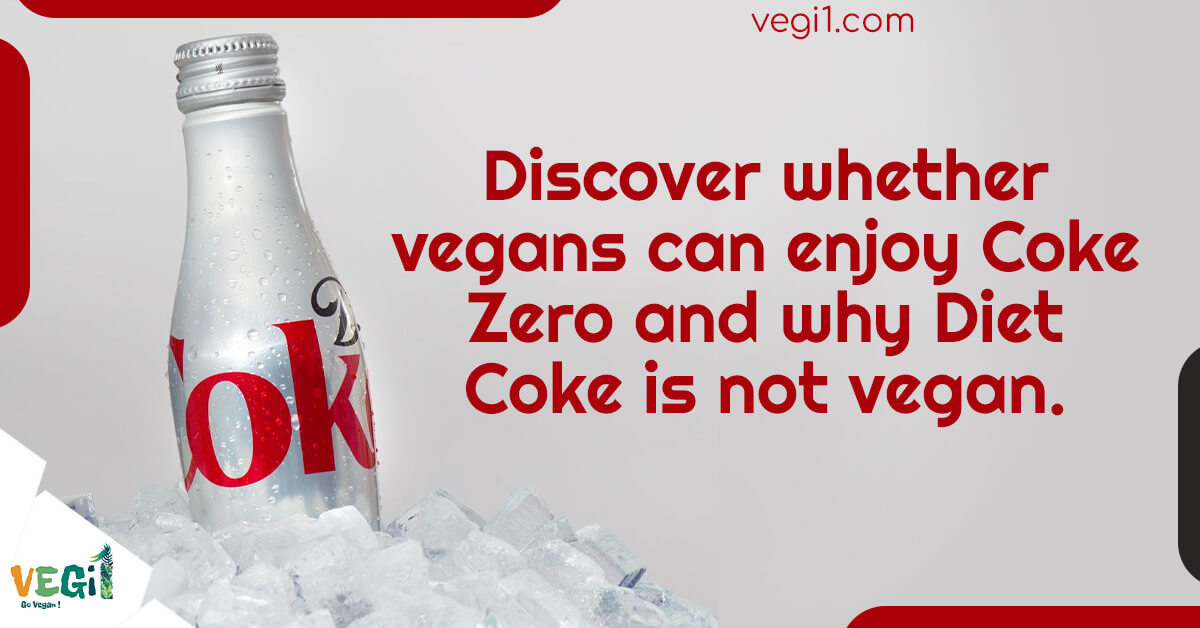
Is the Sugar in Coca-Cola Vegan?
I researched to find out the truth about the sugar used in Coca-Cola.
Some sugar companies used bone char, made from animal bones, to filter sugar in the past. However, many sugar companies have stopped using this process, and vegan-friendly alternatives are now available.
Coca-Cola claims they do not use bone char in the sugar they use to make their products. Instead, they use various methods to purify their sugar, including ion exchange, carbon filtration, and multiple-effect evaporation.
That being said, it’s important to note that Coca-Cola does not guarantee that its sugar suppliers do not use bone char. So, while Coca-Cola claims that the sugar they use is vegan, there is still a possibility that some animal-derived products may have been used in the process.
After all, some vegans avoid ingredients connected to animals in any way, including sugar that may be processed using bone char. But is this something we all need to worry about?
According to The Vegan Society’s widely used definition, veganism excludes all forms of exploitation and cruelty to animals as far as possible and practicable. But where does that leave us when it comes to sugar?
PETA acknowledges that eating vegan isn’t about perfection and encourages vegans not to stress too hard about sugar if they’re unsure about its production methods.
Ultimately, the decision to consume Coca-Cola or any product containing sugar is up to you. you may choose to avoid it altogether, while others may decide it’s not practical to worry about every ingredient.
If you’re concerned about the sugar in Coca-Cola, there are plenty of vegan alternatives available, such as juices, teas, and plant-based sodas.
It’s all about finding what works for you and supporting companies that align with your beliefs.
Let’s continue to strive for a more compassionate and sustainable world!
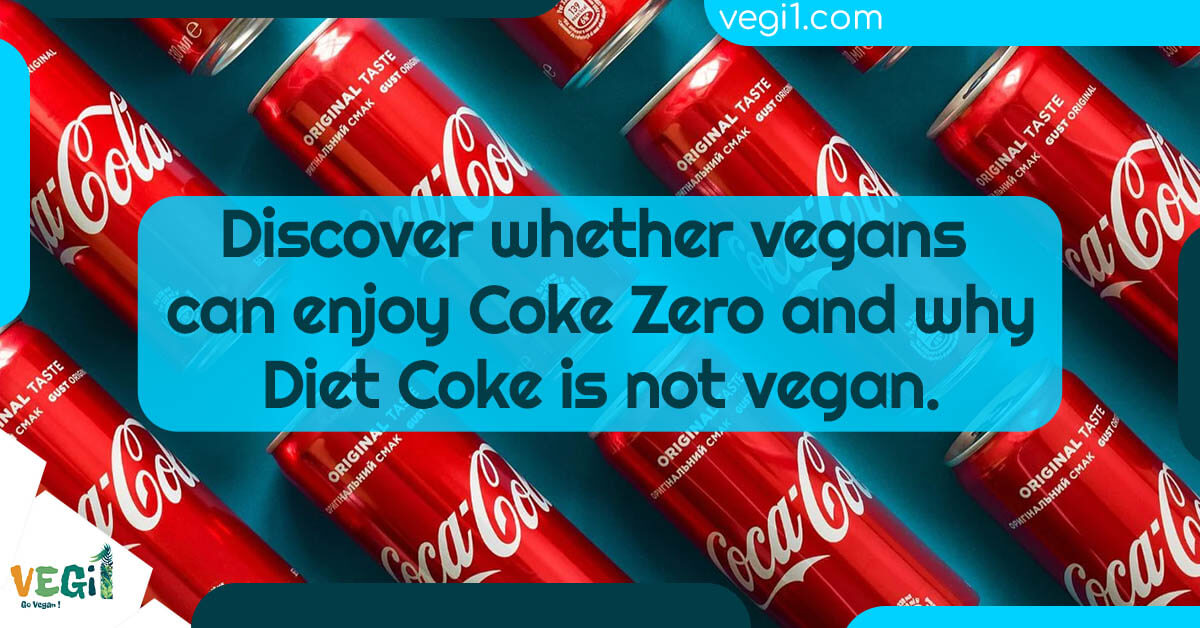
Can vegans drink coke zero ? why is diet coke not vegan?
I was surprised to discover that Diet Coke might not suit vegans.
Well, it all comes down to one ingredient: aspartame. Aspartame is an artificial sweetener commonly used in many diet drinks, including Diet Coke. While aspartame itself is not derived from animal products, it’s often tested on animals before being approved for human consumption. And as a vegan, I avoid using products that have been tested on animals.
But there are other reasons why Diet Coke might not be vegan-friendly. In some countries, the production of aspartame involves the use of animal-derived enzymes. This means that even if the aspartame itself is not tested on animals, the production process might still involve animal products.
Coca-Cola, the company that produces Diet Coke, has stated that their aspartame is not produced using animal-derived enzymes.
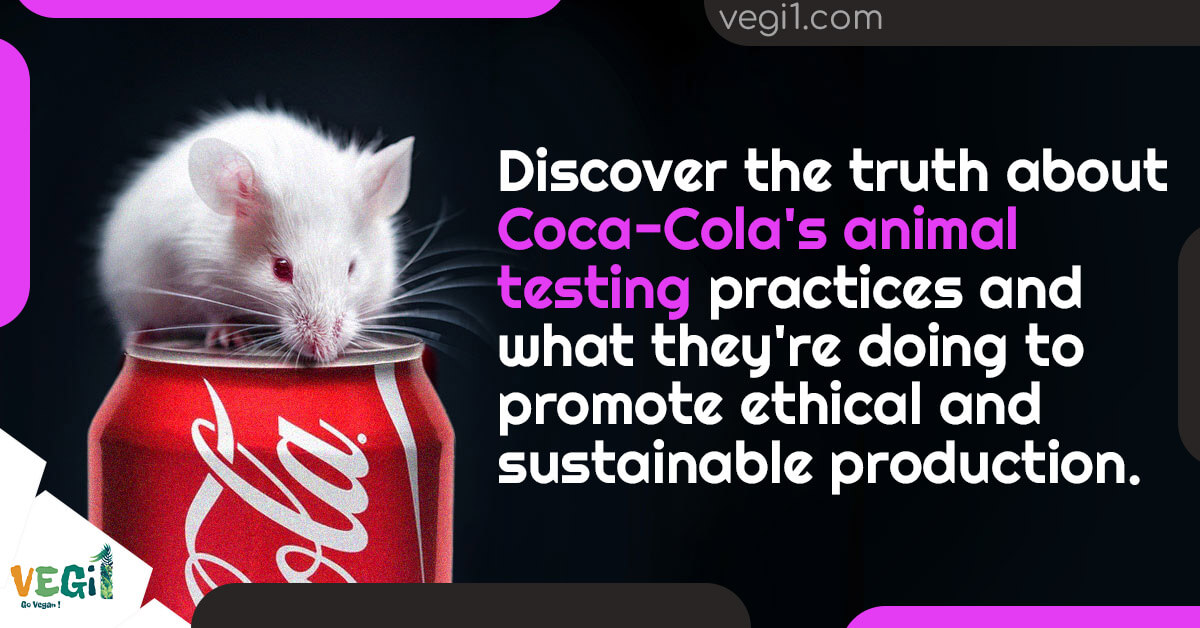
Does Coca-Cola conduct animal testing?
As an animal rights person, I’m always curious about the practices of companies I support. Recently, I’ve been hearing rumors that Coca-Cola might be involved in animal testing, which concerns me. I decided to research to get to the bottom of this issue.
First, let me start by saying that Coca-Cola is a massive corporation with a global reach; as such, it takes time to get a complete picture of its practices. However, after digging around, I found some reassuring information. According to Coca-Cola’s official website, the company does not conduct animal testing on its products or ingredients. They state that they rely on other methods, such as computer modeling and in vitro testing, to ensure the safety of their products.
That’s great news for vegans who want to ensure our choices align with our values.
Also,Coca-Cola has implemented a Supplier Guiding Principles policy that prohibits animal testing by its suppliers, except in rare cases where it is required by law.
However, it’s worth noting that some of Coca-Cola’s ingredients may have been tested on animals by their suppliers or third-party labs. While Coca-Cola does not conduct animal testing, it may use ingredients tested on animals in the past.
As vegans, we always want to make sure that we are aware of the ethical practices of all companies involved in producing the products we consume.
But overall, I’m happy that Coca-Cola is taking a stand against animal testing and working towards more ethical and sustainable practices. As conscious consumers, it’s important that we continue to demand cruelty-free and eco-friendly products from all companies.
So, let’s keep spreading the message and supporting companies that align with our values.
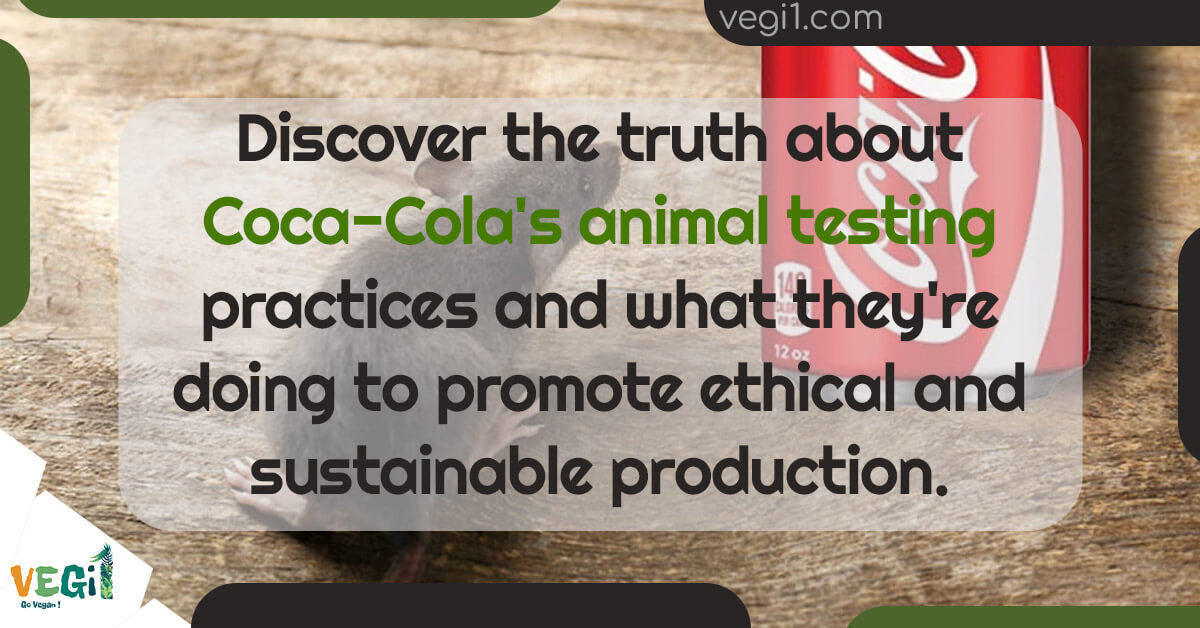
The environmental impact of Coke production: Does Coca-Cola align with vegan values?
I’m always looking for ways to reduce my environmental impact. One question that’s been on my mind lately is whether the production of Coca-Cola aligns with my values as a vegan. I did some digging, and what I found might surprise you.
- The production of Coca-Cola is incredibly resource-intensive. The company uses vast amounts of water to produce its products, particularly in areas where water resources are scarce.
- Also, the bottling and transportation processes consume a lot of energy. In addition, Coca-Cola has been criticized for the environmental impact of its packaging. Single-use plastic bottles, for example, are a major contributor to the world’s plastic waste crisis that can take hundreds of years to decompose. Coca-Cola produces billions of them yearly.
- Furthermore, Coca-Cola production requires vast amounts of energy, including fossil fuels, contributing to greenhouse gas emissions and climate change.
So, does Coca-Cola’s production align with vegan values? Well, as vegans, we’re concerned with reducing harm to animals. Still, we’re committed to promoting sustainability and reducing our environmental impact.
While Coca-Cola has made some strides in reducing its environmental impact in recent years, there is still room for improvement.
But here’s the thing: we, as consumers, have the power to make a difference. By supporting companies that prioritize sustainability and reducing their environmental impact, we can message that we care about the planet and the well-being of all its inhabitants, human and non-human alike.
So, what can we do?
- First, for our own health, we can reduce our consumption of Coca-Cola and other soft drinks.
- Second, we can support companies prioritizing sustainability and reducing their environmental impact.
For example:
One option is to choose alternative beverages produced with more sustainable practices, such as those made with plant-based ingredients and packaged in environmentally-friendly materials.
Another option is to reduce our consumption of single-use plastics and encourage companies to take more responsibility for their environmental impact.
Together, we can make a difference and work towards a more sustainable future.
I will introduce you to some of the best alternatives to Coca-Cola!

Which Coca-Cola Drinks Are Not Vegan?
Here are some of the Coca-Cola drinks that are unsuitable for vegans due to the use of controversial ingredients :
Glaceau Vitaminwater Zero Sunshine and Multi V: While these drinks are free from animal products, they contain vitamin D3, which can be sourced from animal products.
Lilt and Lilt Zero: Both of these drinks contain traces of fish gelatin, which is not vegan-friendly.
Honest (Lemon and Honey): This drink contains honey, a product made by bees and unsuitable for a vegan diet.
Barista Bros: Barista Bros is a range of flavored milk drinks that contain milk and cream, making them unsuitable for vegans.
Schweppes Indian Tonic Water: This drink contains high fructose corn syrup, which may be filtered using animal-derived products.
Schweppes Orange Squash: This drink contains carmine, making it unsuitable for vegans.
Kia-Ora Orange Squash No Added Sugar: This drink contains carmine, a red food coloring derived from cochineal insects, making it unsuitable for vegans.
These are just a few examples of Coca-Cola drinks unsuitable for vegans. As always, it’s important to check the label and ingredients list of any food or drink you consume to ensure that it aligns with your ethical and dietary choices.
Which Coca-Cola drinks are 100% vegan
I was happy that Coca-Cola has confirmed that most of its drinks are vegan-friendly, including Coca-Cola Classic, Coca-Cola Zero Sugar, and Sprite. These drinks are free from animal-derived ingredients and safe for vegans, which is excellent news for us!
I’m excited to share with you the list of vegan-friendly drinks options available at Coca-Cola that you can enjoy without any worry:
- Glaceau Smartwater/Vitaminwater
- Grapetiser
- Appletiser
- Coke Classic
- Coke Raspberry
- Coke Vanilla
- Dr. Pepper
- Fanta Orange
- Fanta Jelly Fizz
- Fanta Passionfruit Cream
- Powerade
- Oasis
- Sprite
- Lift
- Appletiser & Grapetiser
Source :https://www.coca-colacompany.com/au/faqs/is-coca-cola-vegan
Unpacking the Health Risks of Coca-Cola: What Every Vegan Needs to Know
My kids love Coca-Cola, and as a responsible mom who cares about my family’s health, I researched the health effects of Coca-Cola. I know it’s a delicious drink that’s been around for over a century, but what are its potential health effects? Let’s dive in!
First, Coca-Cola is a sugary drink that contains high fructose corn syrup or sucrose, which can lead to weight gain and increase the risk of diabetes and heart disease. In fact, a single can of Coca-Cola contains about 39 grams of sugar, which is more than the recommended daily limit.
But it’s not just the sugar content that’s concerning. Coca-Cola also contains phosphoric acid, which can erode tooth enamel and lead to dental problems. Additionally, the caffeine in Coca-Cola can cause dehydration and disrupt sleep patterns, which can impact our overall health and well-being.
So from a purely vegetarian standpoint, drinking Coke is not inherently dangerous. However, it’s worth noting that Coca-Cola is high in sugar, which can lead to a host of health problems like obesity, diabetes, and tooth decay. Plus, consuming large amounts of sugary drinks has been linked to an increased risk of heart disease, kidney disease, and other health issues.
So, what’s the verdict? While Coca-Cola is not dangerous for vegetarians, it’s still important to be mindful of the health effects of sugary drinks. If you choose to drink Coke, do so in moderation and balance it with plenty of water and a healthy diet. And if you’re looking for a more health-conscious alternative, there are plenty of plant-based drinks on the market that are lower in sugar and have fewer negative health effects.
Let’s continue to make choices that align with our values and help protect the planet!
Vegan alternatives to Coca-Cola: What are your options?
I understand the importance of finding alternatives to non-vegan products, including beverages like Coca-Cola.
Fortunately, there are a variety of vegan-friendly options available that can help satisfy your soda cravings without compromising your values.
-
Vegan-friendly drink brands
One option is to look for vegan Coke brands that are explicitly labeled as such. Some of the most famous ones are:
-
Zevia
One popular brand is Zevia, which offers a wide variety of soda flavors, including cola, without any artificial sweeteners or colors.
Zevia uses stevia and monk fruit extract to sweeten its beverages, making them a healthier and more natural option.
-
365 Cola
Another vegan-friendly Cola brand is Whole Foods’ 365 Everyday Value Cola.
This cola is made with natural flavors and caramel color, giving it a classic cola taste without any animal-derived ingredients.
In addition, it’s an affordable option for those on a budget.
-
Blue Sky
Blue Sky is another vegan cola brand that uses natural flavors and colors to create a refreshing and flavorful beverage.
Their cola is sweetened with pure cane sugar, giving it a natural sweetness that is less processed than many other sodas.
Making Coke at home
Another way is to make your own herbal cola at home. Not only is it a fun and creative activity, but it’s also a great way to reduce your carbon footprint and avoid the controversial ingredients in commercial brands.
I’ve been experimenting with different cola recipes at home and found one that’s delicious and easy to make. Here’s my go-to recipe for vegan-friendly coke:
First, you’ll need to gather your ingredients. You’ll need
- 1 cup water
- 1 cup sugar
- 1 tablespoon citric acid
- 1 teaspoon vanilla extract
- 1 teaspoon cinnamon
- 1 teaspoon nutmeg
- 1 teaspoon coriander
- 1 teaspoon orange zest
- 1 teaspoon lime zest
- 1 teaspoon lemon zest
- 1/4 teaspoon caramel color
- 2 cups carbonated water
Instructions:
- First, combine the water and sugar in a saucepan and heat over medium heat until the sugar has dissolved.
- Next, remove from heat and stir in the citric acid, vanilla extract, spices, orange zest, lime zest, lemon zest, and caramel color.
- Allow the mixture to cool to room temperature.
- Then, Once cooled, pour the mixture into a glass jar or bottle and add the carbonated water.
- Stir gently to combine, and voila! Your homemade vegan cola is ready.
- Serve over ice, and enjoy!
I’ll admit that this recipe may not taste exactly like commercial cola brands. But it’s a delicious and customizable way if you want to make your own vegan-friendly cola at home.
Let’s review
Thanks for joining me today to explore whether drinking Coke is okay.
We have explored the various ingredients in Coca-Cola and how they align with vegan values. We have also delved into the production process and discussed using animal-derived filtering agents. Finally, we looked at the sugar used in Coca-Cola and its vegan status.
In the end
It’s great to see that Coca-Cola has made an effort to cater to the growing number of vegans and environmentally conscious individuals by offering a variety of vegan-friendly options. It’s a win-win situation as we get to enjoy our favorite drinks while making a positive impact on the planet.
However, it’s important to note that while these drinks do not contain animal-derived ingredients, the manufacturing process may still involve animal-derived filtering agents such as bone char or gelatin. If you’re a strict vegan who avoids such products, you may opt for other vegan soda alternatives that use different filtering methods.
It’s up to each of us to make a difference through our choices and actions.
What do you think about Coca-Cola? Are you going to continue drinking it, or are you going to look for alternatives? Let us know in the comments!











May I simply just say what a comfort to uncover an individual who actually knows what they are talking about on the internet. You definitely realize how to bring an issue to light and make it important. More and more people have to look at this and understand this side of your story. Its surprising you arent more popular because you surely possess the gift.
Thank you so much for your kind words and encouragement. It means a lot to me. I’m really glad to hear that you found the information valuable and that it resonated with you. I’m passionate about shedding light on important topics like veganism and helping people understand the different aspects of it. Hopefully, as more people come across this information, it will create a greater understanding and appreciation for the vegan lifestyle. Your support is truly appreciated, and I’m grateful to have you as a reader. Together, we can make a positive impact! 🌱💚